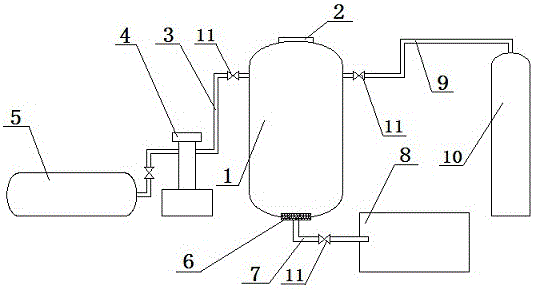Method for recovering highly pure potassium chloride from fluorination reaction byproduct
A fluorination reaction and potassium chloride technology, applied in the field of chemistry, can solve the problems of calcium fluoride precipitation with small particle size, filtration, inability to recycle potassium fluoride, high cost and environmental protection problems, etc., to improve solid form and improve utilization Value, low cost effect
- Summary
- Abstract
- Description
- Claims
- Application Information
AI Technical Summary
Problems solved by technology
Method used
Image
Examples
Embodiment 1
[0035] Add 1000g of fluorination reaction by-product KCl-KF mixed salt (20% potassium fluoride mass fraction) dried at 500°C for 2 hours into the autoclave, add 1200g of liquid ammonia to dissolve at 20°C and pressure of 1.3Mpa, Then filter, the filtrate is the liquid ammonia solution of potassium fluoride, gasification promptly obtains 196g pure potassium fluoride powder, purity 99%, yield 98%, filter cake is potassium chloride crude product, filter cake is mixed with 11g water and 69g Rinse with a mixed solution of ethanol, then add about 1560g of water to dissolve the solid, then slowly raise the temperature to about 80°C until the solid is just completely dissolved, then cool down to room temperature, and add 3120g of isopropanol for recrystallization to obtain potassium chloride crystals , and then washed with an appropriate amount of isopropanol and dried to obtain 750g of pure white potassium chloride with a purity of 99.92% and a yield of 93.8%.
Embodiment 2
[0037] Add 1000g of fluorination reaction by-product KCl-KF mixed salt (10% potassium fluoride mass fraction) dried at 500°C for 2 hours into the autoclave, add 600g of liquid ammonia to dissolve at 20°C and pressure of 1.3Mpa, Then filter, the filtrate is the liquid ammonia solution of Potassium Fluoride, gasify to get 97g of pure Potassium Fluoride powder, the purity is 99%, the yield is 97%, the filter cake is the crude product of Potassium Chloride, the filter cake is mixed with 13g of water and 77g Rinse with a mixed solution of ethanol, then add about 1760g of water to dissolve it, then slowly raise the temperature to about 80°C until the solid is just completely dissolved, then cool down to room temperature, and add 3520g of isopropanol for recrystallization to obtain potassium chloride crystals, Then wash with an appropriate amount of isopropanol and dry to obtain 850 g of pure white potassium chloride with a purity of 99.95% and a yield of 94.4%.
Embodiment 3
[0039] Add 1000g of fluorination reaction by-product KCl-KF mixed salt (30% potassium fluoride mass fraction) dried at 500°C for 2 hours into the autoclave, add 1800g of liquid ammonia to dissolve at 20°C and pressure of 1.3Mpa, Then filter, the filtrate is the liquid ammonia solution of Potassium Fluoride, gasify to get 294g of pure Potassium Fluoride powder, the purity is 99%, the yield is 98%, the filter cake is the crude product of Potassium Chloride, the filter cake is mixed with 10g water and 60g Rinse with a mixed solution of ethanol, then add about 1370g of water to dissolve it, then slowly raise the temperature to about 80°C until the solid is just completely dissolved, then cool down to room temperature, and add 2740g of isopropanol for recrystallization to obtain potassium chloride crystals, Then wash with an appropriate amount of isopropanol and dry to obtain 656g of pure white potassium chloride with a purity of 99.92% and a yield of 93.7%.
PUM
| Property | Measurement | Unit |
|---|---|---|
| particle diameter | aaaaa | aaaaa |
| particle size | aaaaa | aaaaa |
| particle diameter | aaaaa | aaaaa |
Abstract
Description
Claims
Application Information
 Login to View More
Login to View More - R&D
- Intellectual Property
- Life Sciences
- Materials
- Tech Scout
- Unparalleled Data Quality
- Higher Quality Content
- 60% Fewer Hallucinations
Browse by: Latest US Patents, China's latest patents, Technical Efficacy Thesaurus, Application Domain, Technology Topic, Popular Technical Reports.
© 2025 PatSnap. All rights reserved.Legal|Privacy policy|Modern Slavery Act Transparency Statement|Sitemap|About US| Contact US: help@patsnap.com

